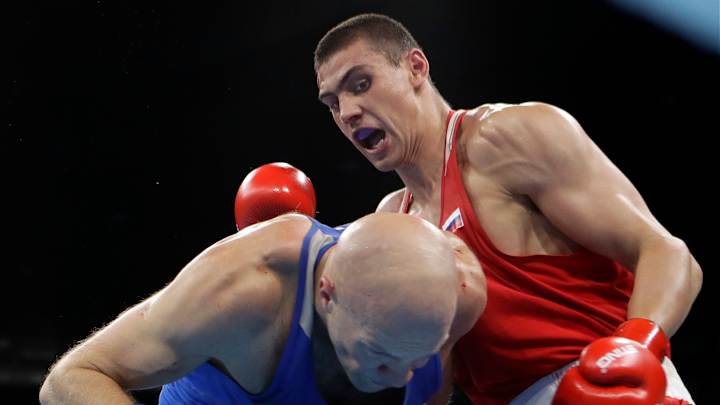Column: Judging problems return to Olympic boxing

RIO DE JANEIRO (AP) Maybe having pros box in the Olympics isn't such a bad idea after all.
While they're at it, they might start getting some professional judges, too.
A lot of what is still wrong with Olympic boxing was exposed in the heavyweight gold medal fight Monday night, when Russia's Evgeny Tischenko was handed an inexplicable decision win over Vassiliy Levit of Kazakhstan in a fight that was almost as ugly as the scoring.
That it came with the head of the International Olympic Committee in attendance couldn't have been good for the future of the sport. Boxing has had a rocky road in the Olympics recently, and Thomas Bach couldn't have been happy with what he saw as boos cascaded down when the unanimous decision was announced.
Had Bach stuck around for the medal ceremony he would have heard even more boos, as fans expressed their displeasure once again. Standing on the medal podium, Levit put his finger to his lips in an unsuccessful attempt to stop fans from booing Tischenko as he was given the gold medal.
This was supposed to be an Olympic boxing competitcoion like no other, with the men shedding headgear and the judging converted to the same type of 10-point must system used in the pro ranks. Pros were also invited to compete, although they were included so late that only three journeymen fighters signed up and all were drummed out of the competition before the first week was over.
Up until the heavyweight final it had all worked fairly well. Without headgear, fans were able to see the faces of fighters, and the new scoring forced fighters to actually get into scraps instead of trying to land pitty-pat punches one at a time from the outside.
The only real downside was a big increase in cuts without headgear, some of which caused competitive fights to be stopped early. That happened a few fights earlier Monday when Daniyar Yeleussinov of Kazakhstan was cut in the second round against Souleymane Cissokho of France in their welterweight semifinal.
Still, boxing seemed like boxing again, a contrast to previous Olympics when headgear and a computer scoring system that awarded points for touches turned it into something more akin to fencing with gloves.
The old system was put into place to get away from scoring controversies in the wake of the horrendous decision that cost Roy Jones Jr. his gold medal against a hometown fighter in Korea in 1988. But judges pushing buttons seemed to get even more decisions wrong, and there was a time where the sport's very future in the games was in jeopardy.
Just what the three judges scoring the heavyweight final saw to award this fight to Tischenko wasn't exactly clear. Levit forced the fight, getting inside against his taller opponent and smothering his punches. It wasn't pretty by any means and neither fighter looked particularly skilled, but it was clear to almost anyone in the arena that Levit had done enough to win the fight.
That included the fighter himself, who was confident right up until the decision was announced that he had won the biggest fight of his life.
''In my head I was thinking I won,'' Levit said. ''The coaches were quite happy.''
The crowd booed lustily at the decision, and kept booing long after the fighters had left the ring. The boos got louder during the medal ceremony, when Tischenko should have been enjoying his time in the spotlight.
''I'm really upset about it,'' Tischenko said through an interpreter afterward. ''I respect my opponent and the crowd. I cannot know why they booed.''
If there was an Olympic moment to be taken from the night, it was the gesture of sportsmanship by Levit as the boos kept coming. He put his finger to his lips to try and silence the crowd, though with little success.
''Every fighter that comes to the ring deserves respect,'' Levit said.
Boxing history, of course, is littered with decisions gone bad. Judging fights is more art than science, and what one judge sees another might not even notice.
Incompetence can also play a part. So can favoring fighters for reasons other than what they do in the ring.
None of that really mattered to Tischenko, who ended the night with a gold medal around his neck in an Olympics he wasn't sure he would even be in as Russia faced a possible ban for doping.
''They gave victory to me so there were some reasons for it,'' Tischenko said.
Too bad no one was able to explain just what those reasons were.
----
Tim Dahlberg is a national sports columnist for The Associated Press. Write to him at tdahlberg(at)ap.org or http://twitter.com/timdahlberg
